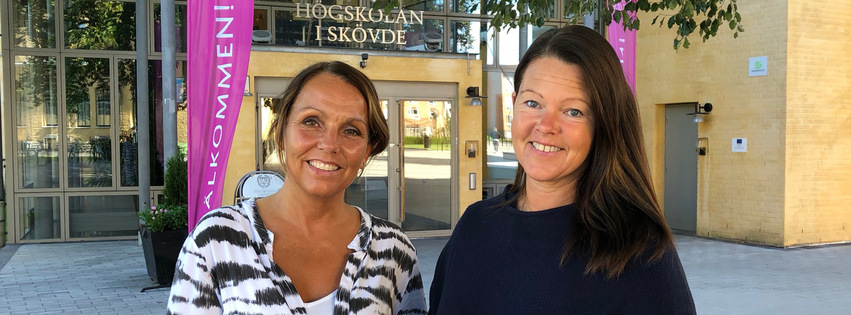During the spring, the university teachers Charlotta Göthe and Cinikka Arthursson left the lecture hall for work in intensive care during the pandemic. They are now back at the University again to welcome students. They both have valuable experience from the Covid-19 pandemic’s intensive care in Sweden.

When the hospitals in early March desperately sought more nurses to cope with the increased burden, Charlotta Göthe, lecturer and Cinikka Arthursson, lecturer did not hesitate. The University of Skövde saw the value in having teachers in the nursing program working at the hospital during the pandemic. They were both given leave of absence and the opportunity to change jobs for a couple of months.
– We now have an incredible experience with us from intensive care work. This increases the credibility of us as teachers, they state.
A very different situation
Charlotta Göthe, anaesthesia nurse worked at the hospital in Lidköping and Cinikka Arthursson at the hospital in Skövde. Both as nurses in intensive care units and for Cinikka, it was mainly about nursing patients affected by Covid-19. Although she has extensive experience of working both at intensive care and as a specialist in ambulance care, this was different.
Completely different.
Historically different.
– Just getting dressed in full protective clothing and a visor was strange, and then be able to work in it. It was also awkward because everything in the Covid-ward was closed. We had to communicate with notes that we showed through a window to get the medicine and materials we needed to the completely closed ward.
Cinikka says that it is also different to take care of patients who need so much technical equipment. During the working days, many information meetings were held, as the situation and directives changed rapidly. Charlotta worked in an ordinary intensive care unit, but after a while they were admitted to infection-free Covid-19 patients who still needed respiratory care.
– Normally patients at intensive care need to be on a respirator for one or two weeks. Those who have had Covid-19, stay for a month. Rehabilitation after such a long time with intensive care is very demanding and extensive, she says.
Important contact with relatives
One of the toughest challenges and an extremely important experience is the extensive contact with relatives. There were many calls to and from relatives when they were not allowed to come for visits. For some of these people, the days before intensive care were also the very last days they were ever allowed to spend together ever.
– It is awful to know that your loved one is fighting for her or his life. It was hard to see that they could not be there. We had an incredible amount of contact with relatives and they have been very understanding. The experience constitute the extensive and daily contact with both relatives and patients, we definitely take this with us to the students, says Charlotta Göthe.
They talk about the importance of really giving accurate information to relatives and not just talk about when, where and how. They talk warmly about humility and, as a nurse to always follow your heart and intuition. Charlotta and Cinikka state that it has been useful for them to be able to take on the role again of being new in a workplace, even though they have many years of experience.
– It is important to remember that you do not know everything. It is therefore important to ask colleagues for help, and doing it early is not a weakness, but a strength.
They both see the benefits of recently working as nurses and not least during the current pandemic.
– The pandemic is something historic, and we have worked with it and have experiences of it, says Cinikka Arthursson.
Experiences that future nurses studying at the University of Skövde can take part of now.
Contact
Cinikka Arthursson, lecturer
cinikka.arthursson@his.se
0500-448409
Charlotta Göthe, lecturer
charlotta.gothe@his.se
0500-448418
